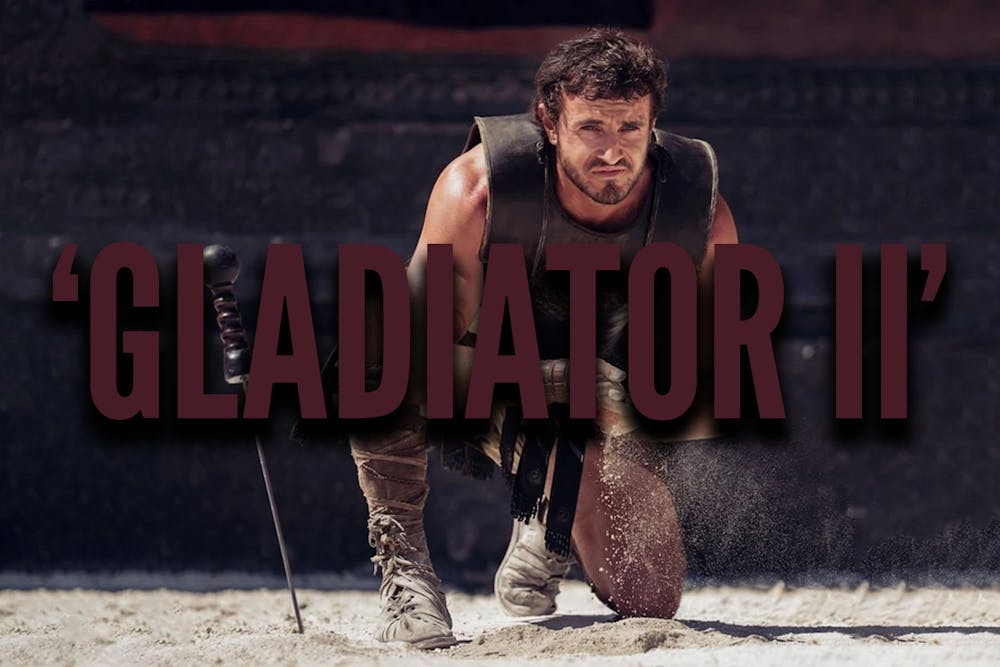In the original “Gladiator,” released in 2000 and directed by Ridley Scott, the emperor Marcus Aurelius declares that “There was once a dream that was Rome. You could only whisper it. Anything more than a whisper and it would vanish.”
“Gladiator II,” also directed by Ridley Scott, treats the first “Gladiator” film with the same legendary status that Marcus Aurelius does the Roman Republic in the first film. Between the stylized opening montage of the main scenes from the original film and the repeated quotes from the first film, “Gladiator II” is shameless in its appeals to nostalgia. However, amidst its veneration of the first film and despite its many flaws, “Gladiator II” emerges as an effective work in its own right, living up to the gravitas and scale of the first film.
Replacing Russell Crowe as the lead is Irish actor Paul Mescal, who plays Lucius Verus Aurelius. He is the illegitimate son of Lucilla Aurelius (Connie Nelson), daughter of Marcus Aurelius, and Maximus Decimus Meridius, Crowe’s character from the first film. Although the existence of Maximus’s illegitimate son somewhat undermines his fidelity to his dead wife and son portrayed in the first film, the continuity from the first film is effective in introducing Lucius to the audience as an adult. Mescal delivers a strong performance and possesses the gravitas that made Crowe’s character so likable. While somewhat bland at first, his character comes into his own by the end of the story and his speech during the film’s final battle is excellent.
Where Mescal’s character falters, however, is in Scott’s insistence on giving him the same character arc as his father. The film begins with Lucius living in Numidia in Africa, where he is shown to have a wife. His idyllic life quickly falls apart, however, when a Roman fleet attacks the city, killing his wife and enslaving him, casting our minds back to the death of Maximus’ wife and child in the first film at the hands of the emperor Commodus.
While Scott appears to be attempting to give Mescal a motive to fight and to be enraged at the Roman Empire, no such motive is needed. Lucius has already been forced to flee Rome as a child due to political turmoil and had his father killed by a Roman emperor — certainly that would serve as motivation enough. Lucius’ wife is hardly mentioned again during the rest of the film and her inclusion feels more like a trope than a meaningful character motivation.
Also struggling to bear the weight of an underdeveloped script is Pedro Pascal's character General Acacius. Pascal is clearly committed to the character and delivers a strong performance, but his motivation to rebel against the emperors and his relationship with Lucilla both feel underbaked. On the other hand, Denzel Washington’s Macrinus, while certainly not historically accurate, is one of the best parts of the film. Washington steals the scene in every moment of screen time and stands out amidst other comparatively bland characters.
What “Gladiator II” does best, however, apart from the epic fight scenes and strong performances, is its depiction of an empire in decline. The film portrays the Emperors Caracalla and Geta, brothers played by Fred Hechinger and Joseph Quinn respectively, as incompetent rulers of a once great empire. They lavish themselves in food, drink and bloody entertainment as societal order crumbles around them. All the while, they are easily manipulated by the ambitious Macrinus.
Against the political backstabbing and cultural decline stand Lucius and the senators and military leaders loyal to the “dream that was Rome.” In vain, they try to restore the Republic, as their plots are foiled and they are arrested. In the end, Lucius defeats Macrinus, stops an attack between Roman legions in Rome and pledges to restore Marcus Aurelius’ “dream.”
The seemingly optimistic ending, however, cannot be extricated from the historical reality that the Republic was never restored. In the end, we know how Lucius’ efforts will end — in failure and more chaos. Nevertheless, the depiction of his and his allies’ struggle for a better society is valiant. In simply refusing to give into tyranny and decline, they preserve their noble dream.
Such is the case with Scott’s dream for “Gladiator II.” Scott may not achieve a film that is the true equal of its predecessor, but “Gladiator II” is a noble attempt that comes close. Its direction, its performances and its themes are all worthy of the dream that was “Gladiator.”










